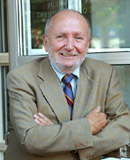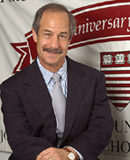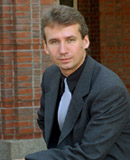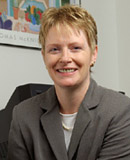Past Fellows and Visiting Faculty
Fall 2003 Fellows
 James W. Carey is the CBS Professor of International Journalism in the graduate school of journalism at Columbia University and adjunct professor at Union Theological Seminary, both in New York City. He was dean of the College of Communications at the University of Illinois at Urbana-Champaign from l979 to l992. Prior to that, he held the George H. Gallup Chair at the University of Iowa. He has published two books: Media, Myth and Narratives: Television and the Press and Communication as Culture. The University of Minnesota Press published James Carey: A Critical Reader in 1997. At Columbia, he teaches the ethics course required of all students. His research is on the history of journalism and international media. As a Shorenstein fellow, he will work on a short history of journalism for journalists.
James W. Carey is the CBS Professor of International Journalism in the graduate school of journalism at Columbia University and adjunct professor at Union Theological Seminary, both in New York City. He was dean of the College of Communications at the University of Illinois at Urbana-Champaign from l979 to l992. Prior to that, he held the George H. Gallup Chair at the University of Iowa. He has published two books: Media, Myth and Narratives: Television and the Press and Communication as Culture. The University of Minnesota Press published James Carey: A Critical Reader in 1997. At Columbia, he teaches the ethics course required of all students. His research is on the history of journalism and international media. As a Shorenstein fellow, he will work on a short history of journalism for journalists.
 Cornelia Dean was the science editor of the New York Times from January 1997 through June 2003. She was responsible for coverage of science, health and medical news in the daily paper and in the weekly Science Times section. She also writes occasionally for the paper, usually on environmental issues. Before becoming science editor, she worked in the newspaper’s Washington bureau as deputy Washington editor. Her portfolio was domestic policy. She began her newspaper career at the Providence Journal. Her book Against the Tide: The Battle for America’s Beaches was published in 1999 by Columbia University Press. Ms. Dean has taught seminars and courses at the University of Rhode Island, Vassar, and the Columbia School of Journalism, and has spoken to a wide variety of student, journalism and scientific organizations. She is a member of the advisory board of the Metcalf Institute for Environmental and Marine Reporting and in July 2003, will join the corporation of Brown University, her alma mater. While a Shorenstein Fellow, Ms. Dean will work on a book about the misuse of scientific information in American life.
Cornelia Dean was the science editor of the New York Times from January 1997 through June 2003. She was responsible for coverage of science, health and medical news in the daily paper and in the weekly Science Times section. She also writes occasionally for the paper, usually on environmental issues. Before becoming science editor, she worked in the newspaper’s Washington bureau as deputy Washington editor. Her portfolio was domestic policy. She began her newspaper career at the Providence Journal. Her book Against the Tide: The Battle for America’s Beaches was published in 1999 by Columbia University Press. Ms. Dean has taught seminars and courses at the University of Rhode Island, Vassar, and the Columbia School of Journalism, and has spoken to a wide variety of student, journalism and scientific organizations. She is a member of the advisory board of the Metcalf Institute for Environmental and Marine Reporting and in July 2003, will join the corporation of Brown University, her alma mater. While a Shorenstein Fellow, Ms. Dean will work on a book about the misuse of scientific information in American life.
 Ted Gup has been a journalist for 25 years and is currently the Shirley Wormser Professor of Journalism at Case Western Reserve University. He is the author of The Book of Honor: Covert Lives and Classified Deaths at the CIA, which traced fifty years of CIA history through the lives and deaths of covert operatives killed in the line of duty. Book of Honor was named 2001 Book of the Year by investigative reporters and editors and was a finalist for the J. Anthony Lucas Book Prize. A former staff writer for The Washington Post and Time Magazine, he has also written for National Geographic, Smithsonian, the New York Times, Los Angeles Times, Columbia Journalism Review, Newsweek, Sports Illustrated, Mother Jones, Salon and GQ. Gup was a finalist for the Pulitzer Prize in national reporting and recipient of the George Polk Award. He grew up in Canton, Ohio and studied classics at Brandeis University and Trinity College, Dublin, Ireland. He was a Fulbright Scholar in China, a grantee of the John D. and Catherine T. MacArthur Foundation, and a 2003 John Simon Guggenheim Fellow. He lives in Pepper Pike, Ohio with his wife, Peggy, and sons, David, 13, and Matthew, 12. His outside interests include fly-fishing, running, and billiards. While at the Shorenstein Center, Mr. Gup will examine press coverage of the CIA. Paper PDF
Ted Gup has been a journalist for 25 years and is currently the Shirley Wormser Professor of Journalism at Case Western Reserve University. He is the author of The Book of Honor: Covert Lives and Classified Deaths at the CIA, which traced fifty years of CIA history through the lives and deaths of covert operatives killed in the line of duty. Book of Honor was named 2001 Book of the Year by investigative reporters and editors and was a finalist for the J. Anthony Lucas Book Prize. A former staff writer for The Washington Post and Time Magazine, he has also written for National Geographic, Smithsonian, the New York Times, Los Angeles Times, Columbia Journalism Review, Newsweek, Sports Illustrated, Mother Jones, Salon and GQ. Gup was a finalist for the Pulitzer Prize in national reporting and recipient of the George Polk Award. He grew up in Canton, Ohio and studied classics at Brandeis University and Trinity College, Dublin, Ireland. He was a Fulbright Scholar in China, a grantee of the John D. and Catherine T. MacArthur Foundation, and a 2003 John Simon Guggenheim Fellow. He lives in Pepper Pike, Ohio with his wife, Peggy, and sons, David, 13, and Matthew, 12. His outside interests include fly-fishing, running, and billiards. While at the Shorenstein Center, Mr. Gup will examine press coverage of the CIA. Paper PDF
 Tomáš P. Klvaňa‘s experience spans journalism, government service and academia. Recently, he served as the spokesman and policy adviser to the president of the Czech Republic, Vaclav Klaus (March-September 2003). Before joining the government, Klvaňa worked as the deputy editor-in-chief of Hospodarske noviny, a leading Czech daily newspaper affiliated with the Wall Street Journal and Handelsblatt, where he was in charge of international coverage and international cooperation. In 2000–01, Klvaňa was a senior international affairs commentator for another leading Czech daily paper, Mlada fronta Dnes. He covered major international events such as the U.S. presidential elections in 2000 and the G-8 Summit 2001 in Genoa, Italy. From 2000 to 2003, Klvaňa was a frequent guest analyst of international news for Czech Television and Czech Radio. From 2001 to 2003, Klvaňa taught a semester-length course on Media, Culture and Globalization at the New York University Center in Prague. Between 1997 and 2000, he was a visiting professor of journalism at the University of Southern Maine in Portland. He holds a Ph.D. in speech-communication from the University of Minnesota and an M.A. in journalism from Charles University in Prague. Mr. Klvaňa will focus on the interplay of politics, media and civic society in the Czech Republic. His paper will investigate how these forces influence the quality of the emerged democracy in a post-communist country in a period of transition. Paper PDF
Tomáš P. Klvaňa‘s experience spans journalism, government service and academia. Recently, he served as the spokesman and policy adviser to the president of the Czech Republic, Vaclav Klaus (March-September 2003). Before joining the government, Klvaňa worked as the deputy editor-in-chief of Hospodarske noviny, a leading Czech daily newspaper affiliated with the Wall Street Journal and Handelsblatt, where he was in charge of international coverage and international cooperation. In 2000–01, Klvaňa was a senior international affairs commentator for another leading Czech daily paper, Mlada fronta Dnes. He covered major international events such as the U.S. presidential elections in 2000 and the G-8 Summit 2001 in Genoa, Italy. From 2000 to 2003, Klvaňa was a frequent guest analyst of international news for Czech Television and Czech Radio. From 2001 to 2003, Klvaňa taught a semester-length course on Media, Culture and Globalization at the New York University Center in Prague. Between 1997 and 2000, he was a visiting professor of journalism at the University of Southern Maine in Portland. He holds a Ph.D. in speech-communication from the University of Minnesota and an M.A. in journalism from Charles University in Prague. Mr. Klvaňa will focus on the interplay of politics, media and civic society in the Czech Republic. His paper will investigate how these forces influence the quality of the emerged democracy in a post-communist country in a period of transition. Paper PDF
 Regina Lawrence is associate professor of political science in the Hatfield School of Government at Portland State University, where she is director of the Northwest Communication Research Group. She holds a Ph.D. in political science from the University of Washington, teaches courses on political communication, public opinion, and public law, and specializes in research analyzing media coverage of public policy issues. She is the author of The Politics of Force: Media and the Construction of Police Brutality and has published articles analyzing media coverage of environmental issues, welfare reform, and the recent spate of shootings in public schools. Lawrence’s research at the Shorenstein Center will focus on the tendency of news coverage to “individualize” public health problems by highlighting the personal choices that contribute to these problems and often leaving their policy context out of focus. Combining case studies of news coverage of juvenile substance abuse, school violence, childhood obesity, antibiotic resistance, the anthrax scare of 2001, and other health problems, she will analyze how the news reflects and reinforces the predominant American cultural value of individualism and a typically American difficulty in seeing the collective and institutional dimensions of our problems. Paper PDF
Regina Lawrence is associate professor of political science in the Hatfield School of Government at Portland State University, where she is director of the Northwest Communication Research Group. She holds a Ph.D. in political science from the University of Washington, teaches courses on political communication, public opinion, and public law, and specializes in research analyzing media coverage of public policy issues. She is the author of The Politics of Force: Media and the Construction of Police Brutality and has published articles analyzing media coverage of environmental issues, welfare reform, and the recent spate of shootings in public schools. Lawrence’s research at the Shorenstein Center will focus on the tendency of news coverage to “individualize” public health problems by highlighting the personal choices that contribute to these problems and often leaving their policy context out of focus. Combining case studies of news coverage of juvenile substance abuse, school violence, childhood obesity, antibiotic resistance, the anthrax scare of 2001, and other health problems, she will analyze how the news reflects and reinforces the predominant American cultural value of individualism and a typically American difficulty in seeing the collective and institutional dimensions of our problems. Paper PDF

